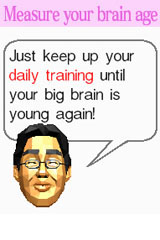How you can train your brain with any game
We've got the games to train your brain – PhD not included!

We're not sure how Doctor Kawashima wrote his thesis, being just a floating head and all, but he seems to know his stuff when it comes to keeping our grey matter in the pink. When his Brain Training got its release on the DS in Japan almost two years ago now, it proved a huge hit with older and more casual gamers who were looking to get something positive out of their playing.
Brain Training and similar titles, such as Brain Age Academy for the DS, the upcoming Hot Brain for the PSP and various mobile brain training games (we like Brain Genius best of those) use a variety of reactive and analytical tests to not only assess how sharp your mind is, but also to improve it on a daily basis.
Whilst there's no medical proof that it works (except for the presence of the aforementioned levitating Doctor), the kick from getting faster at the minute-long brain exercises is just as satisfying as polishing off a sudoku puzzle or nailing a cryptic crossword.
Of course, not all of us want to be doing mental arithmetic and shouting out colours while we're on the bus. The good news is that a lot of the games we've been playing for years can help exercise our brains too – in fact, some of the best games available for our beloved handhelds can be quite mentally taxing.
Take a classic puzzle game like the popular Lumines II on the PSP. Play it in short bursts, just like you might take on a coffee break puzzle, and you're giving your brain the quick, feisty workout it craves. Guiding the blocks into the best positions requires quick decision making, and the quicker the decisions, the more your brain benefits from it.
.jpg)
No wonder she's clutching at her head: Lumines II makes demands on your brain power
Puzzle games like Lumines offer a very obvious mental challenge – Mario Vs. Donkey Kong 2 on DS is another example of a rewarding puzzle game, and of course the faster you're able to guide the little clockwork Mario men to their destination, the better it is for your brain. Matching up obstacles with the tools available to you and co-ordinating more than one area of the level at once all adds to the mental gymnastics.
It doesn't always have to be puzzlers and block-sorting though – rhythm action games like Elite Beat Agents and Gitaroo Man Lives! test hand-eye co-ordination as well as mental concentration.
Much like the famed Stroop Test in psychology, following Gitaroo Man's fast-moving sequences of buttons and guitar thrashing puts high demands on your concentration and reactions. You'll often find yourself second-guessing the next combination, but in order to get through the rock-opera you have to maintain a steady state of focus – there's no room for autopilot.
Perhaps one of the most surprising ways you can build up your brain, though, is through reading. Many of the brain training games feature short reading exercises to test speed, but none of them really offer long-term training unless you're willing to read Sherlock Holmes excerpts every day. But plenty of games feature reams of text – Final Fantasy VI Advance has thousands of lines of dialogue, and with a whole story to discover, chances are you'll actually want to read it. Remember that the faster you read, the more it gets the blood pumping upstairs.
Even a game like Animal Crossing provides this kind of stimulation, which is great news for parents who are worried about their little ones gaming. Reading all of the conversations with their town's inhabitants, as well as co-ordinating birthday presents and letter deliveries, keeps the player busy and multi-tasking, and that makes for a more stimulating 15 minutes than watching yet another cartoon.

Look hard enough and you'll find that a lot of games are good for your brain, even though you might need to give them some help in order to get the most out of it. Navigating through Zelda's dungeons or Grand Theft Auto's cities without looking at maps or directions makes the brain work harder, meaning that you can finally stop feeling guilty about the extra hour you spent shooting up mutant mushrooms when you should have been down the gym.
The benefit that games like Brain Training do offer is that their structure and feedback lets you see just how well you're improving. But don't let that fool you – you've already got plenty of training in your collection.
See our Buyer's Guide to the very best brain training games.